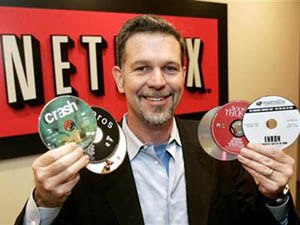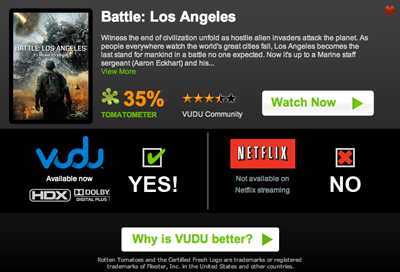This post is also available in: Russian

In early June, AllThingsDigital held a great D9 conference, bringing together the most famous experts in the Internet industry and beyond, including Eric Schmidt (Google), and Reed Hastings (Netflix). The full video recordings of their interviews are published at the AllThingsD website, featuring very insightful and valuable ideas. In this article, we will discuss Reed Hastings views of the Netflix video business, the clues to its success and development strategy.
Reed Hastings has created a unique and very successful company that drove the Blockbuster giant from the market. From the initial DVD postage and rental service, Netflix has grown into the largest online video business with more than 20 million subscribers, continuing to grow rapidly. One of the most discussed topics in Web publications is the amount paid by Netflix to content rights holders. The royalties are ever growing. Reed Hastings says that this is an absolutely normal situation. The number of Netflix subscribers is growing rapidly so that the company can pay more money to purchase content.
When the business had started, postal distribution of rented DVDs was a nuisance for the rights holders, definitely affecting their sales. But with the transition to live streaming of content, Netflix began to pay significant royalties for Web distribution (previously, it only needed to buy a certain number of DVD discs). As a result, Reed Hastings significantly improved his relations with the copyright holders. In the interview Reed says that, generally speaking, the whole relationships issue is overstated. The more money you pay, the better you are treated.

Many competitive video portals (Vudu, Amazon Prime, Hulu plus), build their competitive model on the principle that their content is not available on Netflix. But this has little effect on the Netflix success and growth parameters. The company is carefully selecting the content, offering unrestricted access at just $8 per month. Its selection contains innumerable video content items containing previous seasons of serials, excellent movies released on DVD, and beyond. This way they can keep the price at a very low level and at the same time provide users with a nice selection of videos. Netflix is not going to offer a huge selection of the freshest content, as this would inflate the cost too fast. Most new content is usually offered on a Pay Per View model (with a much higher copyright holder margin). Still, this model has not earned such widespread popularity as flat rate.

Besides its direct competitors like Vudu, Amazon and Hulu, Netflix indirectly competes with cable operators (HBO), satellite TV and telecom providers (Comcast). Ultimately, it is the who user chooses how to watch the movie and how much money to spend on Web content. Many companies are moving towards the TV Everywhere model, expanding the range of devices that can view the content. It is for this reason that Netflix has no HBO content, as HBO is not favoring Netflix success in the long run, so they reject Netflix proposals. During the interview, Reed outlined the following basic principles to drive Netflix competitive edge:
- Improved video quality (UltraHD) – attaining new levels of video delivery. Optical network development provides excellent technical capacities for that.
- Excellent user interface – Apple has proven that the interface layout is of the utmost importance.
- Personalization – offering of high quality content recommendations that the viewer just cannot reject. The better the recommendations, the higher the user longevity.
- Social networking integration – another attempt to bring the power of social networks to enhance the service.
- Going global – service expansion into new countries.
- Video service to every Internet-connected device.
A very important strategic growth direction is to reach all TV screens. In the near future, all TVs will be connected to the Internet via WiFi modules, TVs will have their own App Store to install applications from. A very important task for Netflix is to create the impression that if a device is connected to the Internet, it has a Netflix video service, and this is as logical as having a browser. Tablet PCs and mobile phones are much less interesting for Netflix as consumers of premium content.
Netflix plans into the international expansion (the first country after the U.S. is Canada). In the end of 2011, Netflix is planning to launch another portal in a country other than Canada. The estimated time-to-profit for Netflix video service is 1-3 years, which is a very good indicator. The main competition for Netflix in the new countries is piracy. In the US, Netflix has overtaken BitTorrent by popularity, and indeed has done much to combat piracy: affordable prices have allowed many users to switch to legal content. The main weapon against piracy is easy-to-use service and low prices.
I highly recommend you to see the full interview: Reed is really an excellent speaker.